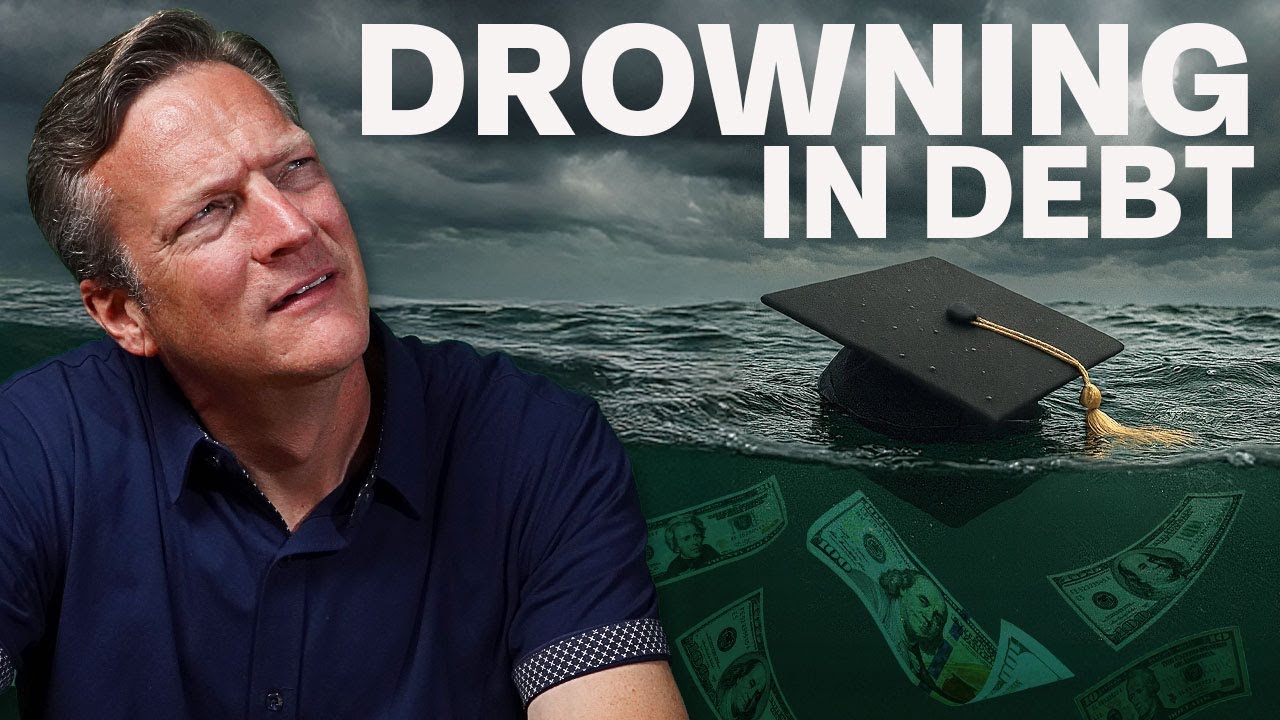We’ve got a question from Kings up next. Kings says, ‘I’m 40. I have $54k in student loans that I want to pay off ASAP with little to no savings in a Roth. Should I still follow the Financial Order of Operations and pay off the student loans before maxing out Roth every year? Do you know the interest?’ He did not provide the interest rate, but at age 40 with $54k in student debt, Kings, if you’re out there, let us know the interest rate; that would be helpful.
So, one of the things you’ve got to think about this in terms of the Financial Order of Operations, Kings. Brian, you have a thing you can hold up. Step three is high-interest debt. It’s this idea that if I have debt that is high interest, I’ve got to think about getting out of that so that it does not negatively impact my financial circumstance. Well, student loan debt can be high interest at different levels for different people depending on their age. We kind of have a rule of thumb that we apply. If you’re in your 20s and the interest on your student loans is above 6%, then you might want to prioritize paying it off. If you’re in your 30s, 5% and above, you might want to begin paying off. If you’re in your 40s, 4% and above, then you might want to prioritize paying 4 to 6% interest, all federal. So, 4 to 6%, right? So, we’re going to argue in your 40s that’s going to fall into the high-interest category. I am of the opinion you are now getting into that stage, getting into that realm where that does begin to qualify as high-interest debt.
But this is what you also said to me, Kings. ‘Hey, I’m 40. I don’t have very much in Roth. I don’t have very much in savings.’ You’re in a situation where the strategy around what do I do first is probably less significant than, ‘Holy cow, I got to change something. I got to figure out how I can aggressively and totally knock out this debt and also aggressively and totally begin to prioritize getting that done and then starting to move towards saving, move towards building wealth because if you just ignore the debt, what’s going to happen is it’s not going to go away. It’s just going to follow you for the rest of your life. And what you don’t want to do is retire and then figure out how much of my Social Security check has to go to Medicare and then how much am I sending to the college that I went to 40 years ago.’
So, I think you ought to have that moment where you think, ‘Okay, I gotta self-assess.’ There are generally two things that people can do when it comes to making financial decisions. They can either go out and make more money, or they can spend less money. I think that has to be where Kings’s priority is. I was on the phone yesterday with a loved one. I helped some family and friends, and one of them we had a phone call yesterday. I had Jonathan in there; he was very helpful on it. But this is because it’s easy for me, Kings, to tell you, ‘Go through the financial order of operations if your interest rate is over 4% and you’re in your 40s, knock that out. Then you can move on to where we get into step five, where the Roth IRAs are.’ But what Bo is alluding to is exactly right; that’s the easy part of this question, which is what do you do with your next dollar? The harder part is that you’ve got a more systemic problem in the fact that you’re in your 40s and you don’t have much money built for the future.
So use this as that fork in the road, incremental decision point, that you say, ‘Holy cow, wake up. Enough time has gone by. You still have opportunities because your future retirement is probably still 20 years in the future. You’ve had 20 years in your rearview mirror since you got out in the workforce. You’re now at that crossroads. Wake up, choose this as your moment to take action and be better.’ We can answer the incremental, ‘What do you do with your next dollar?’ But you’ve got to change your life and use today, use this as motivation. You probably are going to have to take some really hard looks at your lifestyle because to get to 40 in your 40s and not have assets and other things probably meant you had a pretty good time. It’s easy to let life just happen, pay raises happen, and other things, and you never made the deferred gratification or discipline decisions that create the margin. Remember the three ingredients to wealth creation. You first got to have discipline. I don’t see evidence that that’s necessarily showed up in deferred gratification, living on less than you make. The second thing is the margin that comes from discipline that creates the money that gets invested or pays down debt. You know that’s where the financial order of operation sits with that. And then the third thing is giving it enough time. You fortunately have time still. You have 20 years. $4 can still be pretty powerful. Yes, so you still have time on your side, but you’ve got to go squeeze the first two ingredients, the discipline creates the margin so you can make the most of the money that’s created from that. So the two of the three have to get loved on so you can go and correct because you have to. It’s easy; we love that we’re now using Bo’s sayings from high school football or whatever. You know, you do it right; you can do it light. If you do it wrong, you can do it long. And that’s where you’re now in that you’re kind of at that halfway point. So you’re going to get the mixed bag where it’s not going to be light anymore. You’re going to have to do a little more work, a lot more work because you didn’t start in your 20s, but you can still do it. But you can cut some time off that long by doing it, choosing today to be the moment to make that big change. For more information, check out our free resources.














